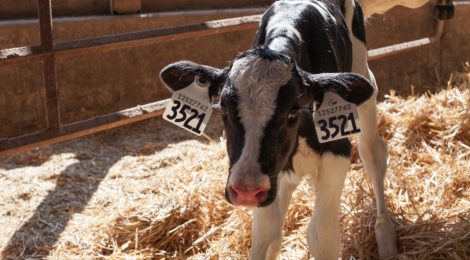
Welfare Implications of CFIA’s Proposed Changes to Animal Identification Regulations
The Canadian Food Inspection Agency (CFIA) recently announced that it is seeking comments on its proposed changes to Part XV (Animal Identification) of the Health of Animals Regulations to “enable a more effective and timely response to disease outbreaks and food safety issues, and improve support for disease surveillance activities.”
The CFIA’s proposal involves broadening movement reporting to all ruminant species [cattle, bison, sheep, goats and cervids (animals like deer and elk who are legally farmed in Canada despite significant welfare implications)]. It also includes shortening the time period allowed to report movement of animals to allow for faster disease outbreak response and adding a requirement to provide information about the location of sites where animals are located (although actual “animal inventories” will not be required).
While we agree that traceability of farmed animals is important in mitigating the risks and impact from disease outbreaks and that gaps in the current regulatory requirements for traceability of farmed animals must be addressed, we have concerns with the proposed regulatory changes to identification requirements. In particular, we are concerned that the requirement of ear tags as the primary approved identification device poses significant welfare concerns for animals. Ear tags are already becoming too numerous for some species and their application inflicts both short term and, in some cases, long term pain (if applied incorrectly or infection develops); they can also be ripped from the ear causing acute pain.
We have written to the CFIA to recommend that the primary and secondary approved identification indicators should be required to be pain-free. We noted that under the proposal, leg bands are only approved for goats, while ear tags are recommended for all species. We have asked that the allowance of leg bands be expanded to include all species covered under this regulatory change. We also noted that tail web tags (generally used on earless goats) are included as an approved identification device but are also known to cause pain so should not be allowed. Similarly, slap tattoos for pigs which involve a multi-spiked tool dipped in ink smashed against a pig’s shoulder should also be revoked. (Interestingly, the CFIA initially had slap tattoos for pigs on the revoked list but because the pig industry complained, it put them back on the approved list.)
We also have serious concerns about the application of ear tags on animals over six months of age and have requested that an age restriction be placed on the tags (as per EU guidelines). We have asked that in these cases, a pain-free alternative method (such as leg bands or neck straps/collars) should be provided. Livestock auctions and collecting stations in particular present a high risk as animals of all ages go through these facilities on a daily basis. Without an age restriction, countless older animals will be forced to endure ear tagging.
The public comment period is open until June 16th. While the CFIA is not soliciting comments from the general public or anyone who advocates for animals (it only considers stakeholders to be those who profit off the lives and deaths of animals), you can still submit comments through the Canada Gazette consultation page here. Further details on the CFIA proposal are available here.


